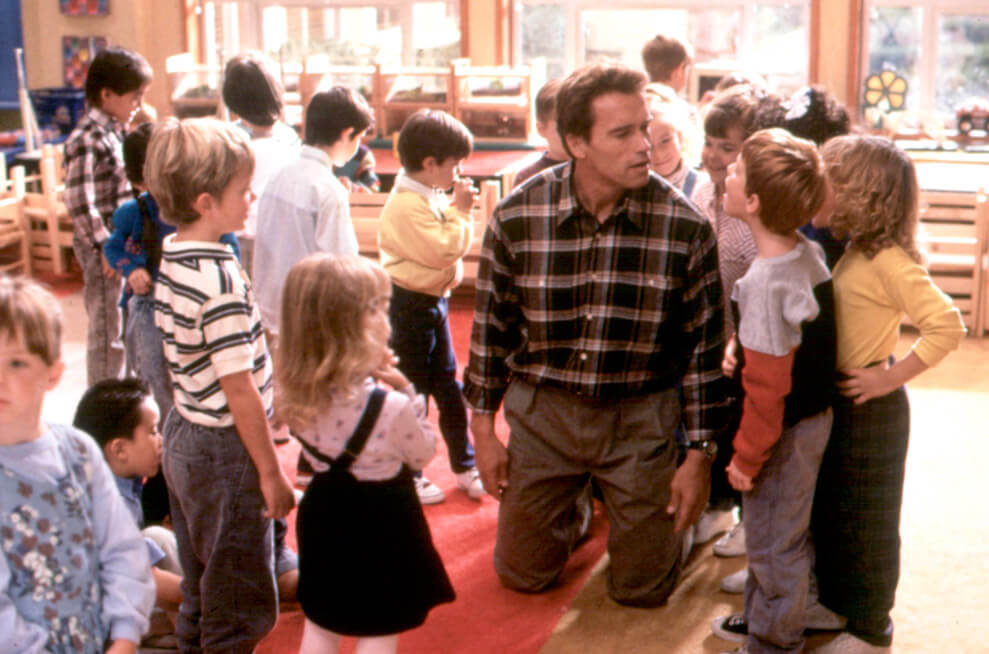The Problem with Universal Pre-K: Is It Worth It?

One of Bill de Blasio’s biggest campaign promises was that, once in office, he would do whatever was necessary in order to guarantee free pre-k for every child in New York City. De Blasio’s proposed “millionaire’s tax,” which he intends to use to pay for the city’s pre-k program, has been one of the more controversial items on the new administration’s agenda, partially because, you know, don’t go after the rich people! What if they leave?! Then what will happen to the rest of us?! How will we survive without the shining example they set, and also, their tax dollars? (That is actually a semi-serious question. This city does, in fact, benefit a great deal from being a population center for the wealthy. Just like the wealthy benefit from getting to live here instead of in a gated compound in Florida or New Jersey or a whole bunch of other places that just aren’t New York City. Anyway!) The other reason the tax has been controversial is that—as many people have pointed out—universal pre-k doesn’t even need to be a city-funded program, and is rather funded by the state. Governor Cuomo has called the tax redundant, saying the state “has it covered.” So what is even going on here? And why the sudden push for universal pre-k? What problems is it even going to solve?
For the millions of New Yorkers who know little to nothing about the difficulties of finding either a spot in a local public pre-k or one in an affordable preschool (to say nothing of all the people who are unaware of the problems inherent within the public education system as a whole), the universal pre-k debate might be nothing more than the kind of political news that buzzes around and around your head without ever really entering your consciousness. After all, whether you’re for the program being funded by the city or against it, the issue at hand seems pretty basic, right? Or, at least, the way that de Blasio and Cuomo are presenting the issue seems pretty basic. Their seemingly logical argument is that once more kids have the opportunity to enter a full day pre-k program, more parents (particularly low-income ones) will be able to work or attend school without also paying for childcare. So basically, kids get a head start on their education and parents have a free alternative to private preschool. What could be wrong with that?
Well, it’s not so much what’s wrong with the idea of universal pre-k as it is what isn’t right about it. The thing that’s been most troubling about this whole pre-k discussion is the suggestion that universal pre-k will not only be a boon to the young children who participate, but will also improve the lives of families as a whole by occupying children during the day so that parents can go to work. In a recent article in the New York Daily News, the claim is made that “for thousands of working city families, Mayor de Blasio’s promise to provide free, high-quality full-day pre-kindergarten could be life-changing. If he delivers, it means mothers could get a job and get off public assistance. Or go to college and get a career.” And later in the piece, the News references “Jocelyn Ramirez, 32, of Cypress Hills, Brooklyn, [who] wakes up at 6 a.m. each day to take her daughter, Artlyn, 3, to a private daycare center she can’t really afford. [Ramirez] works 40 hours per week as an administrative assistant, but the $522 a month she spends on early education day-care takes a big chunk out of her earnings. ‘I’m pretty much working to send her to daycare,’ said Ramirez. ‘She’s learning a lot but it’s expensive. I’m hoping with the universal pre-K, I wouldn’t have to pay for another school.'”
I hate to break it to Ms. Ramirez—and to every other person who has struggled to balance both child-related and professional responsibilities—but universal pre-k won’t solve her problem, and it’s disingenuous for everyone from the people who wrote this Daily News article to Bill de Blasio to Andrew Cuomo to pretend that it will. Full-day pre-k, as it exists in the New York City public school system now, operates on the same schedule as a regular day of elementary school (except, of course, for the random half- and full-days off that pre-k classes experience more than other grades), which means that a typical school day will last from 8:40-3:00. Even accounting for early drop-off times (at many public schools, it is possible to drop children off as early as 7:30 or 8:00), that wouldn’t help someone like Ms. Ramirez, who needs a place to drop her daughter off at 6am. And what about the afternoons? Most after school programs cost money, but even the free programs rarely extend past 5 or 6pm. And even if Ms. Ramirez—and the many other parents with similar schedules—gained access to a pre-k program that worked with her schedule, that would still entail leaving a four-year-old in school for an 11-hour-day. Not only is this a ridiculously long day for a small child, but it also ignores the basic fact that school is not the same thing as childcare, which generally affords some flexibility in terms of scheduling. Yes, school functions as a place in which a child is cared for many hours of the day, but ultimately, school is not a replacement for childcare and pretending that it is will only lead to frustration on the part of the parents and their employers (do you have any idea how many random days off occur during the average school year?), teachers, and, of course, the children themselves.
Of course, pre-k is not only being touted as a boon for working parents, but is also being promoted as an important part of childhood development, specifically for immigrants and/or low-income children who might not have access to the same sorts of educational resources as other children. This is, of course, one of the the best rationales for universalizing the pre-k program, because countless studies have shown the benefits of early childhood education, and the value of having a child’s development watched over by a professional educator is immeasurable. In fact, de Blasio recently recounted that his son Dante had a speech problem identified in pre-k, which was quickly addressed and remedied, something that might not have happened had Dante’s problem not been identified by a professional. However, while Dante (and many others) benefitted from having a trained professional supervising his education, what truly separates someone like Dante from other kids that don’t have their problems identified is the fact that his parents had enrolled him in the program in the first place. De Blasio and Cuomo and all the other advocates for universal pre-k seem to think that once the program is in place, it will dramatically change the lives of thousands of families who hadn’t had access to early education before, but the reality is that all low income families in this city have had access to early education (starting at the age of 3—younger than pre-k) for decades now in the form of Head Start.
Head Start is an early education program first implemented in 1965 as a way to give low-income children a better educational support system than had previously been in place. The program has 250 locations in New York City alone, and not only provides children with free preschool education, but also provides children and families with free, local healthcare and works to educate parents in ways that range from nutrition classes to providing access to GED programs, job training, and housing resources. Plus, because the funding for Head Start comes from the federal government, there is no need to tax city or even state residents in order to get more low-income families involved with preschool education. Is Head Start perfect? No, but nothing is. It is, though, a program with a long, successful track record which provides a preschool education (and so much more!) that specifically caters to the families that need it most, and it already solves many of the problems that de Blasio claims can only be resolved through universal pre-k. Only with Head Start, those problems actually get addressed at an earlier age for the children most in need. What Head Start doesn’t solve (but neither does pre-k) is the reality that for most parents who work a 9-5 (or a 10-6 or an 8-5) job, there won’t be a traditional school-based option that will address the need for childcare. But that is a larger systemic issue in both this city and this country, one that severely impacts the economic mobility of low-income families and always will unless some dramatic change takes place and we institute longer maternity and paternity leaves and have a daycare program that resembles the ones that exist in places like France and Sweden (Sweden’s daycare/preschool program has almost 100% familial involvement as well as low, sliding scale fees and extended hours). But until we have a solution like that? Head Start is a far better alternative for families in need than the proposed universalization of the existing pre-k program.
So, if not the low-income families that always get mentioned in the universal pre-k conversation, who then will benefit the most from the universal pre-k expansion? The middle and upper-middle classes. One of the biggest changes in the city’s public school system in the last couple of decades has been the result of more middle and upper-middle class families choosing not only to raise their children in the city, but also to send them to local public schools. This has resulted in 50-child-long waiting lists for kindergarten spots at coveted zoned elementary schools and the elimination of pre-k classes in overcrowded buildings that needed space for additional classrooms for other grades. Some schools cut down on their full-day pre-k classes and just offered half-days (which amounts to two hours of total class time) because of space limitations. De Blasio pledges to change this with the new universal pre-k system, and add hundreds more classrooms and teachers so that everyone can benefit. But the low-income families who truly need this kind of service already have access to it in the form of Head Start, while families who live in the most desirable school districts who have seen local programs slashed and who would probably benefit the most from having guaranteed local, full-day pre-k. Which, that’s not a bad thing. It’s important to support all families that are in this city’s public school system. As with all public programs, it is only through high levels of engagement that success is possible. But pretending that the introduction of universal pre-k will be some kind of game-changer for low-income families, and that it will only then be possible for low-income parents to get jobs and go to school, is disingenuous at best and intentionally misleading at worst. Universal pre-k would be a good thing for this city, and I hope that it does get instituted, but it won’t solve the problems of the neediest families and is akin to putting a bandaid over a bullet hole. We need a better and bigger solution to the problem of what to do for these children and their families. Bill de Blasio was called a progressive radical communist while he was running for office. It would be nice if he actually brought a little bit of those values to the table now, instead of just revealing himself to be the centrist, ineffective liberal that we’ve seen before. We need real change, and universal pre-k isn’t it. It’s barely even a start.
Follow Kristin Iversen on twitter @kmiversen
You might also like 



















